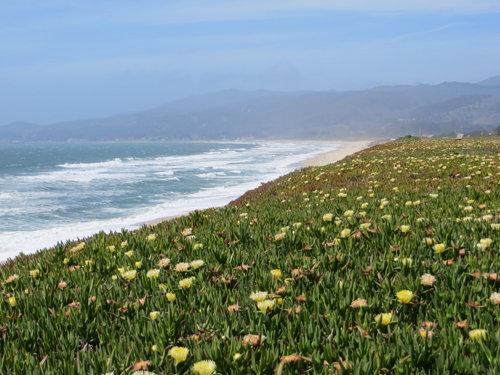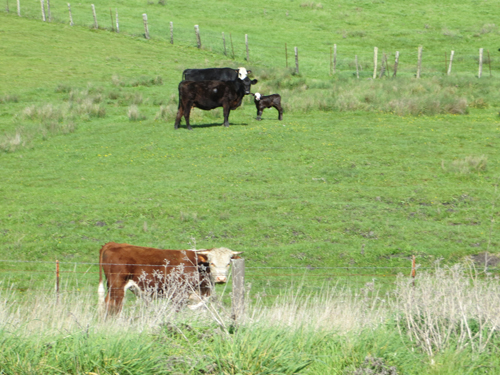Surprise!
Welcome back! Hope you've been doing well. I had a lovely vacation, and I feel fully energized and ready to take on JOK all over again.
I'm revitalized partly because my husband and I spent three days celebrating our anniversary, taking our dogs hither and thither so that they could romp on the beach, go to fancy restaurants, and see the scenery of the San Francisco Bay Area. The dogs had a great time, and the humans did, too.
I'm also full of renewed energy and interest because I've recently come across several instances of my favorite kind of Japanese term—the sort that surprises and charms me to no end.

Photo Credit: Eve Kushner
Half Moon Bay, south of San Francisco.
In a Good Mood
In one case, my proofreader told me that he's been having email problems. I was concerned because today is payday. Would he be able to receive money from PayPal?
"Not to worry," he said in English. "My PayPal account transactions can wait until my Outlook Express is 'in a good mood' (ご機嫌がいい)."
An email program in a good mood! Now, that put me in a great mood! Here, again, is the term he used:
機嫌 (きげん: (1) humor; temper; mood; spirits; (2) safety; health; well-being; one's situation; (3) (usu. as ご機嫌) in a good mood; in high spirits; happy; cheery)
The third set of definitions is relevant.

Photo Credit: Eve Kushner
The Golden Gate Bridge, viewed from Marin County to the north.
A Daily Occurrence
Another proofreader expressed frustration with industrial spying, which he says is rampant in Japan. Using the following term, he deemed it an everyday occurrence:
日常茶飯事 (にじょうさはんじ: everyday occurrence)
ordinary (1st 2 kanji) + tea + meal + thing
A commonplace occurrence is something as regular as drinking tea and eating a meal! People also write this expression simply as 日常茶飯.
Here's a way of using the longer term in a sentence:
スパイ活動は日本では日常茶飯事です。
Spying is an everyday event in Japan.
活動 (かつどう: activity); 日本 (にほん: Japan)

Photo Credit: Eve Kushner
Kanji, ever hopeful about the treat that might come his way.
Losing Interest
I'm lucky to have a great variety of proofreaders who teach me dynamic expressions on a regular basis. (Although it happens all the time, I would never call it a 日常茶飯事, because that could make it sound as if it's too commonplace to interest me.)
Anyway, a third proofreader told me that young people in Japan no longer buy cars because they think it’s a waste of money, can’t afford it, or live near good transportation. For this reason, car companies are pushing hard to sell cars. She noted that there's even a term for the dearth of car purchases by young people:
若者の車離れ
若者 (わかもの: young people); 車 (くるま: cars);
-離れ (-ばなれ: loss of interest in; independence of; distancing from)
I asked proofreader #4 whether I should treat this 離れ as a suffix, because the dictionary had no listing for 車離れ.
"Yes, it's a suffix," he said. "It can go with pretty much anything to mean that people are less interested in what precedes it." As one example he mentioned this common term:
活字離れ (かつじばなれ: loss of interest or shift away from reading (esp. serious) books or literature) printed text (1st 2 kanji) + loss of interest in
Because people today prefer TV, video games, and the Internet to books, 活字離れ is a problem in Japan, just as it is pretty much everywhere.
By the way, 若者の車離れ appears in essay 1652 on 搭 (boarding; loading (a vehicle), which came out today. Here's a preview:

Verbal Logic Quiz
In the downtime afforded by not publishing an essay last week, I managed to work on the JOK site a bit. One project was to change the prefecture list from kanji to romaji (though the changes still aren't up) so that people who register from Japan can have an easier time of it. Who would have thought that I'd find a prefecture list charming or surprising? Well, I did! I've never actually read through a list of prefectures in kanji, and I had a great time challenging myself to see what I knew. I'll share the challenge with you in the form of a quiz.
If you're very familiar with prefecture names and their kanji, this might be like one of those car games you do to entertain yourself in the middle of nowhere. And if you're less familiar with the names, you might want to consult a prefecture list as you consider the answers.
1. This prefecture name contains "big parts": 大分県. How do you read it?
2. One prefecture name contains "high knowledge": 高知県. Another has "love of knowledge: 愛知県. How do you read these names?
3. Do you know how to read the following names:
a. 岐阜県 fork in the road + hill + prefecture
b. 滋賀県 nourishing + joy + prefecture
c. 兵庫県 soldier + warehouse + prefecture
d. 佐賀県 help + joy + prefecture
4. Five prefectures have 山 (mountain) in their names, always pronounced as やま. Which ones?
5. Three prefectures have 川 (river) in their names. Which ones?
6. The names of four prefectures don't end with 県 (prefecture). Which ones?
7. Five prefectures have 島 (island) in their names. Which ones?
8. Four prefectures have animal kanji in their names. Which ones? (The cows below are not a hint!)

Photo Credit: Eve Kushner
Cows near Half Moon Bay.
Answers to the Verbal Logic Quiz
Unless otherwise indicated, all prefectures are on Honshu.
1. 大分県 (おおいたけん: Oita Prefecture on Kyushu)
2. 高知県 (こうちけん: Kochi Prefecture on Shikoku) and 愛知県 (あいちけん: Aichi Prefecture)
3.a. 岐阜県 (ぎふけん: Gifu Prefecture)
b. 滋賀県 (しがけん: Shiga Prefecture)
c. 兵庫県 (ひょうごけん: Hyogo Prefecture)
d. 佐賀県 (さがけん: Saga Prefecture on Kyushu)
4.a. 山形県 (やまがたけん: Yamagata Prefecture)
b. 富山県 (とやまけん: Toyama Prefecture)
c. 和歌山県 (わかやまけん: Wakayama Prefecture)
d. 岡山県 (おかやまけん: Okayama Prefecture)
e. 山口県 (やまぐちけん: Yamaguchi Prefecture)
5.a. 神奈川県 (かながわけん: Kanagawa Prefecture)
b. 石川県 (いしかわけん: Ishikawa Prefecture)
c. 香川県 (かがわけん: Kagawa Prefecture on Shikoku)
6.a. 北海道 (ほっかいどう: Hokkaido, the northernmost island)
b. 東京都 (とうきょうと: Tokyo Metropolis)
c. 京都府 (きょうとふ: Kyoto Prefecture)
d. 大阪府 (おおさかふ: Osaka Prefecture)
7.a. 福島県 (ふくしまけん: Fukushima Prefecture)
b. 島根県 (しまねけん: Shimane Prefecture)
c. 広島県 (ひろしまけん: Hiroshima Prefecture)
d. 徳島県 (とくしまけん: Tokushima Prefecture on Shikoku)
e. 鹿児島県 (かごしまけん: Kagoshima Prefecture on Kyushu)
8.a. 群馬県 (ぐんまけん: Gunma Prefecture), which contains a horse (馬)
b. 鳥取県 (とっとりけん: Tottori Prefecture), which contains a bird (鳥)
c. 熊本県 (くまもとけん: Kumamoto Prefecture on Kyushu), which contains a bear (熊)
d. 鹿児島県 (かごしまけん: Kagoshima Prefecture on Kyushu), which contains a deer (鹿)

Photo Credit: Eve Kushner
Sonoma County (wine country).

Comments